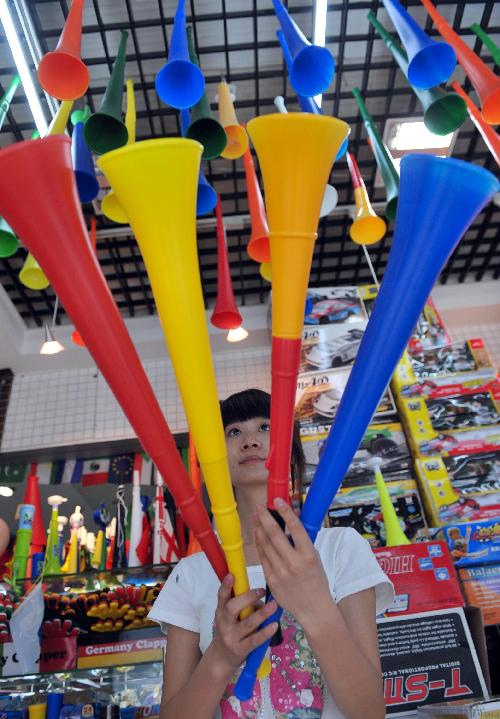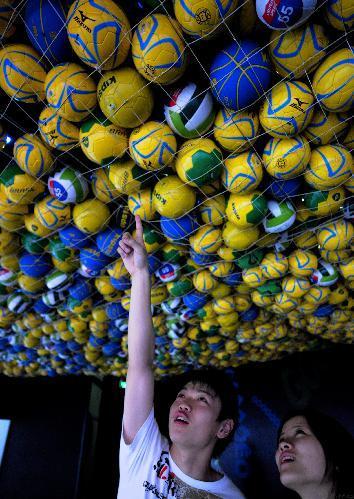|
 |
|
Vuvuzelas,made in China, sell well (Xinhua) |

For the past 50 days, 65-year-old Zhang has been troubled by a lack of sleep. "I keep being woken at three o'clock in the morning by loud noises from the neighboring bars. I discovered fans there were blowing long vuvuzelas every time a player scored a goal," Zhang complained.
When the World Cup kicked off, many Chinese like Zhang began to complain about the noise from the brightly-colored, plastic trumpets. Nevertheless, Chinese merchants have been making a mint out of the horns.
According to China's biggest online shopping platform, Taobao, the vuvuzela has ranked as one of the most popular items sold online. By mid-July, a search on Taobao for "vuvuzela" returned about 993 sale notices, with prices ranging from 5 yuan to 18 yuan or more ($0.7 to $2.6).
Blue Mountain, an online toyshop based in Hangzhou in east China's Zhejiang, a province where most of the horns are made, sold more than 1,933 units in the span of 30 days. The owner said sales were "much better than expected."
It is reported that the manufacturing cost of each trumpet is between 0.6 yuan and 2.5 yuan (about $0.09 to $0.36), but with most retailing from 10 yuan ($1.5), they have sold like a hotcakes on Taobao.
Must-have items
Not only has the trumpet enjoyed extraordinary sales, other World Cup gifts, clothes, foods and home appliances have attracted swarms of buyers looking for must-have items representing the soccer extravaganza.
A recent online survey, conducted by renren.com, one of China's biggest SNS (social networking service) websites, shows the World Cup has helped spur a wave of consumption in the country, with over 70 percent of respondents willing to buy World Cup souvenirs or team jerseys. Most respondents were under 30.
The Spain team jersey is by far the top-selling World Cup merchandise online in China, with over 17,400 jerseys already sold before the tournament started, according to large Chinese e-commerce sites such as Taobao, Paipai and Dangdang. Most of these are shanzhai, or imitation jerseys. Next in terms of sales came the shirts of Argentina, Germany, Italy and Brazil.
One college student, who had bought 20 shirts for about 65 yuan ($9.5) each, said he would give the shanzhai sportswear as gifts to his teammates if they won the championship game in his university's soccer tournament.
An authentic Spain jersey sporting a player's name costs 1,000 yuan ($147) on average, nearly 20 times that of the shanzhai version. "The shanzhai T-shirts don't breathe very well, but for those who would like to wear the shirts while playing soccer, are they willing to have their expensive, authentic shirt ruined on the pitch?" asked Fashionlines, an online vendor selling World Cup T-shirts on Taobao.
"The shanzhai versions are the better choice," said the vendor, adding that he had sold 340 Spain jerseys in the previous month alone, and the orders have been piling up.
According to Taobao's spokesman Zhao Jinpeng, the site sold over 1 million World Cup items in June. Those red-hot sales caused the overall value of July's sales of sporting items to rise about 200 percent compared with the same period last year.
One could be forgiven for thinking that World Cup products cover most areas of daily necessities. Apart from sports-related commodities, World Cup fast food, snacks and beverages are also hot on the web.
A Beijing-based online food dealer launched a "World Cup special offer" that sells snacks for fans while watching games, such as spicy duck neck, peanuts, beef and the like.
The dealer, named Delicate Food, told ChinAfrica that his sales are skyrocketing thanks to the month-long soccer event. "It [the World Cup] brings business opportunities for online traders."
Since the World Cup is such a big event, it inevitably draws the attention and active participation of the people, which leads to concentrated consumption within a certain period of time, explained Ge Jingdong, Internet marketing expert and General Manager of the Marketing Center at leading Chinese news portal sina.com.
"The influence of World Cup related advertising campaigns is bound to create business opportunities for manufacturers," Ge said. The Internet is more than a media format where citizens can access event information; it has become a major, competitive battlefield of Chinese consumption, he added.
Female power
Every four years, when the World Cup arrives, many fans hang out late at pubs and drink beer. But this time round, many also chose to stay at home, buying World Cup souvenirs, toys, clothes and other merchandise online. And storeowners were surprised by the sudden increase of female customers around midnight.
In the first round of the tournament, the first match was regularly aired at 7:30 p.m. in China, the second at 10 p.m. and the third at 2:30 a.m., leaving a gap of a couple of hours between matches. But, many who stayed up for midnight games were not real fans - Sun Xiaomeng was among them.
Apparently Sun didn't like watching matches as much as her husband, Du, who stared at the screen from start to finish of each game. She said she would like to join him to learn more about his hobbies, perhaps to the benefit of their new marriage.
"But sometimes I couldn't help feeling bored, so online shopping became a good choice for me," she said. Apart from the Brazil national uniform for Du, Sun also bought a dress and cosmetics for 1,000 yuan ($147.1), approximately one third of her monthly salary, in a weekend when her husband was cheering for his favorite team, Brazil, as they took on Holland.
Female consumers like Sun helped the online stores achieve a sudden sales boom at night. Figures from Tenpay, a third party payment tool, show that online shopping transactions around midnight rose by nearly 30 percent in July over the previous month, and the majority of items bought from 9 p.m. to 1 a.m. were female items such as dresses, cosmetics and accessories.
The customer service hotline on goupi.com, a leading online retailer selling skincare, makeup and cosmetics, said they had been seeing an increase in women customers at night during the World Cup, which forced them to work overtime.
"During that period, some popular skincare products unusually sold out quickly one night. And we have been besieged by customers who continue to ask when the next batch of goods is due to arrive," a customer service officer told ChinAfrica.
Not having a team in the World Cup doesn't mean that thousands of Chinese businesspeople, from bar owners to online vendors, won't take the opportunity to profit from the event. Likewise, tens of millions of Chinese customers won't cool their enthusiasm for shopping, according to Liu Jia from Zhongnan University of Economics and Law.
But Liu said that, spurred by the massive World Cup advertising programs, customers are more likely to make irrational shopping choices. "I have already heard people complain about not knowing where to keep their vuvuzelas, the noisy horns bought just two weeks ago," said Liu. |